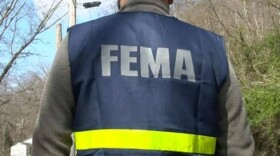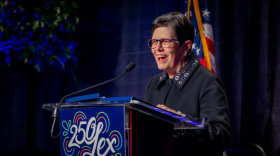AILSA CHANG, HOST:
The head of Venezuela's opposition is calling for a boycott of regional elections this month. It's a way to protest against the country's authoritarian leader Nicolas Maduro amid evidence that he stole last year's presidential election. But the call for an electoral boycott has deeply divided the opposition, as well as one of Venezuela's most prominent political families. John Otis has more.
(CHEERING)
JOHN OTIS, BYLINE: Turnout was massive in Venezuela's presidential election last July. Although opposition leader Maria Corina Machado was banned from running, her stand-in candidate, Edmundo Gonzalez, won by a landslide, according to voter tally sheets. However, President Maduro refused to give up power. Gonzalez fled overseas as security forces arrested thousands of protesters. Machado, the opposition leader, remains in Venezuela, but she's in hiding.
(SOUNDBITE OF ARCHIVED RECORDING)
MARIA CORINA MACHADO: (Speaking Spanish).
OTIS: Unlike last year, when she convinced millions of Venezuelans to vote, she's now urging them, through videos on social media, to stay home during elections for the National Assembly and state governors on May 25.
(SOUNDBITE OF ARCHIVED RECORDING)
MACHADO: (Speaking Spanish).
OTIS: Until Maduro recognizes that the opposition won last year's election, she says, taking part in another round of voting would only legitimize Maduro's regime. One politician endorsing the boycott is Juan Pablo Guanipa, a former opposition congressman.
(SOUNDBITE OF ARCHIVED RECORDING)
JUAN PABLO GUANIPA: (Speaking Spanish).
OTIS: Amid Maduro's crackdown on dissent, he says Venezuelans who vote for the opposition could be tossed in jail. He adds, you can't ask people to go to their own sacrifice. The Guanipa family has itself paid a huge price for getting involved in politics.
(SOUNDBITE OF ARCHIVED RECORDING)
J P GUANIPA: (Speaking Spanish).
OTIS: Fearing arrest, Juan Pablo Guanipa says he's gone into hiding. His brother, Pedro Guanipa, who worked for the opposition mayor in the city of Maracaibo, was detained in September.
(SOUNDBITE OF ARCHIVED RECORDING)
PEDRO GUANIPA: (Speaking Spanish).
OTIS: That's Pedro Guanipa in a video from prison, in which, according to relatives, his captors forced him to confess to corruption charges.
CAROLL FIGUEREDO: (Speaking Spanish).
OTIS: Pedro Guanipa's wife, Caroll Figueredo (ph), says she's been unable to visit him in prison or even talk to him on the phone. Yet, for all the pain and agony, Figueredo plans to vote in this month's elections. She says that's what her husband, as well as many other opposition politicians, believe is the correct strategy. They also complain that Machado, the opposition leader, called for a boycott without consulting them.
FIGUEREDO: (Speaking Spanish).
OTIS: Figueredo adds that past electoral boycotts backfired because they simply surrendered more power to the Maduro regime. To avoid such an outcome, a third Guanipa brother is out on the campaign trail, holding town hall meetings.
(SOUNDBITE OF ARCHIVED RECORDING)
TOMAS GUANIPA: (Speaking Spanish).
OTIS: Tomas Guanipa is a former legislator who's running for his old seat in the National Assembly.
T GUANIPA: (Speaking Spanish).
OTIS: "Under a dictatorship, voting is a method of resistance and protest," he says. "It shows that you are not surrendering, that you are still fighting."
David Smilde, a Venezuela scholar at Tulane University, points out that even when elections are deeply unfair, there can be surprises. He points out that in Chile in 1988 and Nicaragua in 1990, upset victories by the opposition helped those nations transition to democracy.
DAVID SMILDE: That doesn't mean that every election you win that the government is then suddenly going to give over power. But it's like playing soccer, you know? It's like, you got to get the ball in the area and get it in front of the goal, and then, you know, 1 time out of 10, you're actually going to get that goal.
OTIS: Others say the opposition should use this month's balloting as a warm-up for a battle with much higher stakes - a voter referendum on the constitution that could happen later this year. Maduro wants to rewrite the magna carta to make Venezuela even more like totalitarian Cuba, says political analyst Eugenio Martinez.
EUGENIO MARTINEZ: (Speaking Spanish).
OTIS: And unless the opposition mobilizes to block these changes, Martinez says, elections of Venezuela may no longer matter.
For NPR News, I'm John Otis.
(SOUNDBITE OF MUSIC) Transcript provided by NPR, Copyright NPR.
NPR transcripts are created on a rush deadline by an NPR contractor. This text may not be in its final form and may be updated or revised in the future. Accuracy and availability may vary. The authoritative record of NPR’s programming is the audio record.







